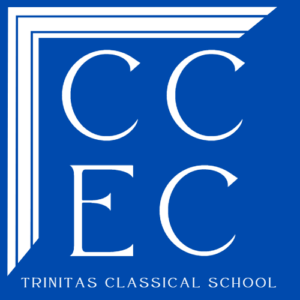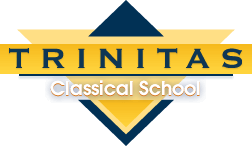 Mrs. Tellinghuisen returns to the CCE Corner to share about last week’s chapel guests, her seminary program, and the importance of hiding God’s word in our hearts.
Mrs. Tellinghuisen returns to the CCE Corner to share about last week’s chapel guests, her seminary program, and the importance of hiding God’s word in our hearts.
There’s a delicate balance to be found between the task of learning and the joy of learning. These two things are not mutually exclusive, but they don’t always overlap. Sometimes the learning process is hard and doesn’t leave us feeling joyful. We may, even in moments of frustration and impatience, have a sense of satisfaction that we are growing in knowledge (hopefully wisdom too). But we might not call that joy.
This is food for thought in a classical school that has high standards and lofty expectations. We ask a lot of our students. (Case in point, how many middle schoolers do you know who study Greek?) Each day at Trinitas is full, for our curriculum is full. And each day, a certain amount of work needs to happen. Facts must be taught. Concepts must be applied. Assessments must be given. There are learning tasks that must happen in a classroom. Of course, how that happens makes all the difference. The goal of teaching is transformation, but we all know that knowledge alone can’t transform hearts.
The challenge for a Christian classical school is even greater. We have Bible classes. We have Bible memorization assignments that, yes, are graded work. But even if we know that memorization is important and good for our kids (good for adults too), we may wonder—Is this assignment being presented as a joy as well as a task? Is it being received as a joy and not just a task?
Last spring, I started a Doctor of Ministry program at Western Theological Seminary. My cohort, “Performing the Bible,” is learning about a branch of biblical studies that examines biblical stories as words not just to be read, but embodied: heard, seen, and felt. Please note, I’m not speaking against books. Some rooms in my house resemble a library. I have a t-shirt that says “Carpe librum!” (Seize the book!) But reading, even if it is the primary way of engaging Scripture for many of us, need not be the only way. Something happens when a story is told as opposed to read. You can emphasize a word, you can pause between words, you can gesture, you can make eye contact. In short, you can embody it. And your listener—because telling a story requires sharing it with another—may hear and see and feel something they might have missed in reading it.
According to the Guinness World Records website, “The best-selling book of all time is the Christian Bible. It is impossible to know exactly how many copies have been printed in the roughly 1500 years since its contents were standardized, but research conducted by the British and Foreign Bible Society in 2021 suggests that the total number probably lies between 5 and 7 billion copies.”* What a wonder the printing press was! And with each technological advancement, God’s word spreads to more and more. Hallelujah! But humans tend to discard the past in our race to move forward. We are prone to think that old means outdated. So we might ask if something was lost when humans moved from oral storytelling to book reading, just as we have clearly lost something moving from books to screens. How might we retain that which is wise and valuable even as we gain new resources? What would it look like to employ all our senses in our learning and living of Scripture?
If you attended last week’s chapel with Jeff and Karen Barker, you will know what I’m talking about. Jeff told Revelation 4, that is, he shared Revelation 4 as if it were a guided tour of that wondrous vision. If you were there, did you see and hear and feel it differently than if you had read it? That’s not say that reading that passage isn’t good or speaking it is better. It isn’t a matter of comparison. It’s about expanding the imagination and enriching our encounters with Scripture.
Before Jeff shared that passage, he and Karen presented a short play about two young friends talking about the task of memorizing Scripture. These children had some misunderstandings (some of them quite humorous) about what the Bible was saying. And there was a bit of frustration about learning verses by heart, even when given the chance to go to Chicago by train as motivation. The young boy in the play wasn’t sure he could do it, but his friend suggested he memorize the Ten Commandments by way of a memory aid. On one level, that little chapel play was about a young boy’s memorization task. But it was also about encouragement and friendship and the body of Christ. There is joy in learning Scripture—treasuring Scripture—together.
I have hidden your word in my heart that I might not sin against thee. As a child, I was inclined to hear this as a warning, i.e., if you don’t read God’s word, you will fall into sin. This felt like task, not joy. What I failed to realize is that there are countless other reasons why we should hide God’s word in our hearts: to comfort us when we are alone or afraid, to strengthen us when we are weak and tired, to guide us when we can’t see the way clearly. Thy word is a lamp unto my feet and a light unto my path. Because books and screens are everywhere, we may feel less of a need for memorization, but literally, metaphorically, and certainly spiritually, we can find ourselves alone and in the dark. It leads me to think of Galadriel’s gift to Frodo in The Fellowship of the Ring, a phial of starlight: “May it be a light for you in dark places, when all other lights go out.” Such is the word of our Lord.
Memorization is work. It requires a development of habit, as all spiritual disciplines do. Requiring Bible memory as part of the curriculum helps us build habits in our students that will, hopefully, continue long after they leave Trinitas. (Some alumni have shared that they still remember the Sermon on the Mount.) But just because something is work doesn’t mean it can’t be done with joy. And to that end, we seek to provide engaging encounters with Scripture across our curriculum: telling Bible stories with felt figures, chanting Bible facts, writing and illustrating verses, dancing to psalms, sharing and singing Scripture at Lessons and Carols, Latin nativity plays, diagramming a New Testament verse in Greek, parable enactment, and Advent activities. (Watch for details about this year’s Advent project!)
We can present all kinds of opportunities for Scripture engagement, but our job (parents and teachers, alike) is not complete if we don’t communicate the reason. Memorization isn’t simply an academic or creative exercise. We memorize Scripture so that we may more fully internalize the truth of God’s love and our identity as his beloved children. As a Christian classical school, we believe there is no greater task than that. And there is no greater joy.
*https://www.guinnessworldrecords.com/world-records/best-selling-book-of-non-fiction
© RRT
